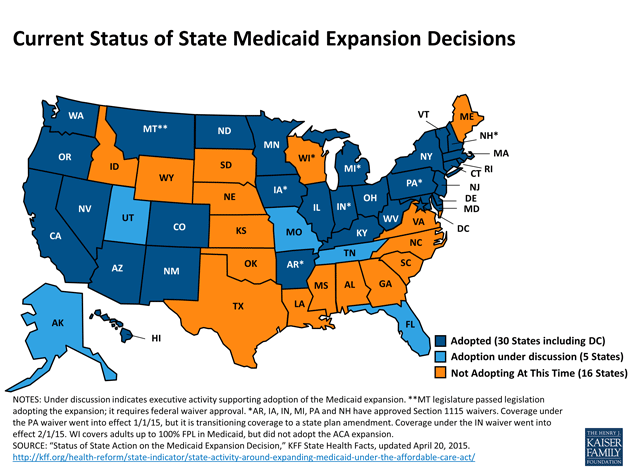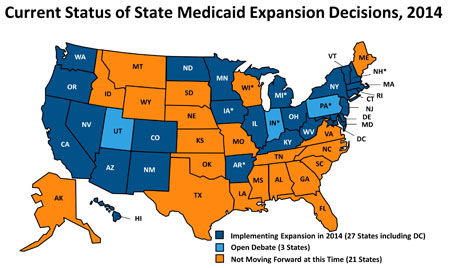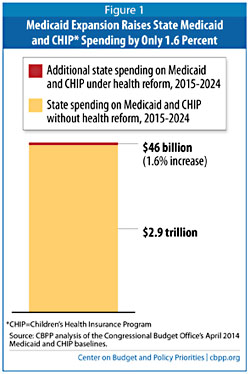
Kaiser Family Foundation
One of the Affordable Care Act’s major provisions sought to expand the number of people covered by Medicaid by allowing people earning up to 138 percent of the poverty line to enroll.
But in many parts of the country, it hasn’t worked out that way. Individual states are largely responsible for running Medicaid, and despite the act’s generous terms—the federal government promised to initially cover 100 percent of the cost, then 90 percent after 2016—only 29 states have taken the deal. Of the holdouts, most are conservative states with Republican governors where Obama is unpopular.
Some red states have been coming around, lured by of the enormous infusion of federal funds they’ll receive by expanding Medicaid. And without participating, states soon stand to lose billions in other payments designed to compensate hospitals for care for the uninsured. (Florida could lose more than $2 billion on account of leaving 800,000 residents uninsured who could otherwise be covered under Medicaid.)
Despite that carrot and stick, Republican-controlled states have demanded additional concessions from the Obama administration before taking part in the expansion—and in many cases, as a new paper from the National Health Law Program suggests, the administration has agreed to changes that undermine its own goal of expanding coverage.
These changes have made some states’ Medicaid programs more, well, Republican—not to mention punitive. Take Arkansas, which in 2013 was allowed to use its Medicaid funds to let poor residents buy private insurance on the state health exchange—policies that may not have the same protections or coverage as traditional Medicaid. Iowa and New Hampshire have followed suit. According to the NHLP, these initial waivers emboldened states to seek even greater concessions. An example is Indiana, where, in exchange for agreeing to expand Medicaid, officials not only won the right to charge poor people premiums and co-payments, but also to lock people out of the program for at least six months if they fail to pay those premiums.
The administration has granted such waivers through its authority to authorize so-called demonstration projects to encourage policy innovation in the states. But NHLP contends that waivers like Indiana’s violate the law, which “requires demonstrations to actually demonstrate something.” As NHLP points out, reams of research have long showed that such premiums dramatically reduce health coverage for low-income people. After the Obama administration granted Indiana’s request, Arkansas went back to ask for permission to charge premiums, too. And it prevailed.
And yet some states still want more. Florida, for instance, is considering a bill that would use billions of dollars of Medicaid money to provide vouchers to poor people to buy private insurance. But anyone getting a voucher would have to pay mandatory premiums, and also either have a job or be in school. Childless adults need not apply. (The administration hasn’t signed off on this one—yet.)
NHLP suggests that the Obama administration is undercutting its very strong bargaining position by allowing states to dismantle Medicaid through waivers, at the expense of the very poor and sick. Its white paper notes that Medicaid’s history proves even the most ardent opponents of government health care eventually come around: In 1965, when the program was first created, only 26 states joined in. Five years later, though, almost all had.









